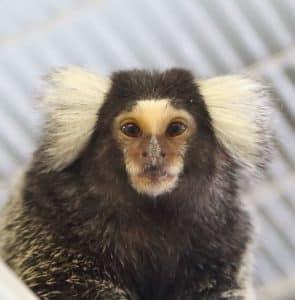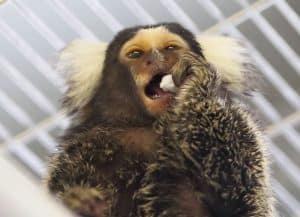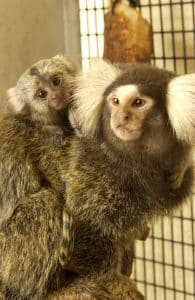
Texas Biomedical Research Institute and UT Health San Antonio have signed an animal care and joint research agreement to move dozens of important research animals from the Sam and Ann Barshop Institute for Longevity and Aging Studies to the Southwest National Primate Research Center (SNPRC) on the Texas Biomed campus.
Texas Biomed uses its population of approximately 340 marmosets for various research projects, including experiments involving the emerging Zika virus and research into Parkinson’s disease. The marmosets from UT Health San Antonio’s Barshop Institute are used in aging research as part of the San Antonio Marmoset Aging Program (MAP). Combined, these programs will maintain more than 400 marmosets for research, making it the country’s largest marmoset colony dedicated to aging and infectious diseases research.
Marmosets are small New World monkeys that are excellent animal models in many areas of biomedical research.
“Marmosets are becoming an increasingly important biomedical model and are of particular interest in aging studies, due to their relatively short life span compared with other types of primates. The SNPRC has dedicated facilities and staff for the care and management of this unique species,” said Professor Suzette Tardif, Ph.D., Associate Director of the SNPRC.
Texas Biomed recently invested more than $2 million updating an entire building devoted to the care of this species with the capacity to hold up to 550 marmosets.

Photo courtesy Kathy West Studios
“To understand aging and how interventions such as exercise, diet and pharmacological agents might improve health across the life span, it is helpful to conduct comparative biology studies across species, including rodents and small animals. Marmosets have proven to be a great addition to the science of aging,” said Nicolas Musi, M.D., Barshop Institute Director and Professor of Medicine in the Joe R. and Teresa Lozano Long School of Medicine at UT Health San Antonio.
The MAP colony of marmosets at Texas Biomed will be made up of 90 to 175 animals including a population of geriatric marmosets (animals between the ages of 10 and 20 years old) and a population of mid-life marmosets (between 6 to 9 years old) necessary for future aging studies.
Prior to their transport to Texas Biomed from the Barshop Institute, marmosets will undergo a medical evaluation to make sure they are healthy enough to move. Once the animals are housed at Texas Biomed, their care will be overseen by SNPRC staff and the Institutional Animal Care and Use Committee (IACUC) on the Texas Biomed campus.
“The agreement between UT Health San Antonio and Texas Biomed to jointly manage the Marmoset Aging Program, housed at Texas Biomed, is an example of the highly collaborative relationships between our biomedical science institutions in San Antonio,” said Professor Joanne Turner, Ph.D., Texas Biomed VP for Research. “We see ourselves as collaborators and not competitors within the biomedical science space, and Texas Biomed welcomes additional citywide interactive projects in the future.”
Texas Biomed and UT Health are both engaged in research and public health missions. This collaboration is a reflection of those shared values.

“The National Institutes of Health plans to launch funding to expand marmoset research, and this agreement will provide an exceptional resource to our institutions and collaborators to understand the neurobiology of aging and treat conditions ranging from neurodevelopmental and neurodegenerative disorders to infectious diseases,” said Professor Andrea Giuffrida, Ph.D., Vice President for Research at UT Health San Antonio.
The agreement to merge these research animals to one location at the SNPRC was signed on earlier this month. The animals will be transferred this summer.